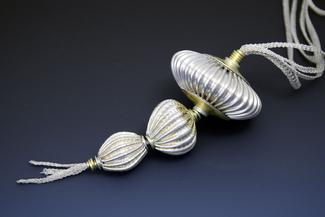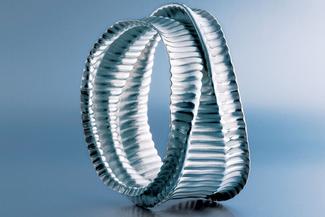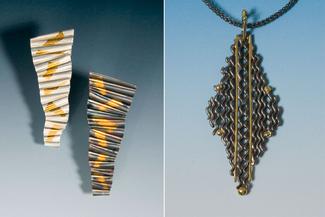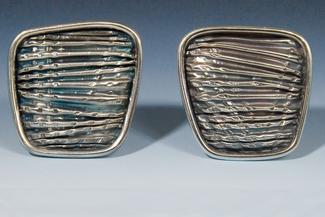Microfolding and Corrugation
Microfolding can also be called corrugation. The characteristic undulations add strength to thin metal, making it possible to create large, yet light and sturdy, jewelry. This process offers endless possibilities for creativity through texturing and forming.
A wide variety of techniques and textural possibilities will be demonstrated including: fanfolds and ribbon forms, smocking, confirming and pleating, fold forming, using a corrugation compressor, and making microfolded beads. Each demonstration s followed by work time.
Process, technique, and design are emphasized in this class, instead of being project-oriented. Participants may choose to make lots of samples, or to focus on a few finished designs. This course is for participants with the basic skills of Jewelry 1 as well as advanced students and professionals.
Meet the instructor
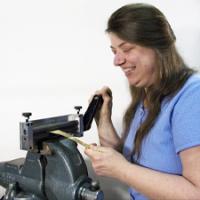
Whether using hammers and stakes, or hydraulic press tools, Cynthia's sculptural jewelry and hollowware shows her focus on exploring the fluidity with which metal can be moved, formed, and joined.
Cynthia Eid co-authored the book Creative Metal Forming, with Betty Helen Longhi, published in 2013 by Tim McCreight's Brynmorgen Press. In his foreword for the book, Michael Good says the authors "have succeeded in assembling the first comprehensive textbook on synclastic and anticlastic forming." (More about the book available at www.creativemetalforming.com.)
Cynthia and Betty developed a set of anticlastic stakes, and Eid also works with Knew Concepts and Bonny Doon to help make tools for jewelers and metalsmiths. Lee Marshall has dubbed Cynthia Eid "Godmother of the Knew Concept Saws" since it was her idea for him to produce these saws for jewelers.
Excited about working in sterling silver without the problem of firescale, Cynthia has been working with Argentium Silver since 1999. After meeting Peter Johns (the inventor of Argentium Silver) in 2003, Eid has participated in AS's development. Argentium International, Ltd recognizes her as a Pioneer.
Cynthia Eid's metalwork has won awards for creativity and design, been featured in many publications, and been exhibited internationally. With a BS in Art Education and MFA in Jewelry, Design, and Silversmithing, she has previously worked as a bench jeweler for fine goldsmiths, a model-maker in a gold jewelry factory, and on private commissions. Her work is in museums in the US and UK. Currently an independent metalsmith and educator, she teaches weekly classes at Metalwerx in Massachusetts, and workshops and short courses in the US, Canada, Europe, and Australia.
Materials & Tools
A materials kit will be provided for each student. It is estimated to cost $40 and is payable to the instructor at class. It includes plenty of copper and nugold sheet for making all of the forms during class. (Contact us for specific gauges and amounts if you would like more info)
There will be microfold brakes and pliers for workshop participants to share. If you would like to order your own tools, we may be able to purchase them for a better price, due to volume. Please contact instructor at [email protected] by January 7, 2016. If you would like her to purchase tools for you. Exact prices will not be known until they are ordered.
- Microfold Brakes ( Rio Grande #115090 - $135-149)
- 2” wide Swanstrom Confirming Pliers (Rio Grande #111124 - $43-47)
- 1” pliers Swanstrom Confirming Pliers (Rio Grande #111121 - $41-45)
Tools and Supplies - Necessities
- Close-toe shoes (for safety in case of dropping something hot, sharp, or heavy)
- Energy and enthusiasm
Tools and Supplies – Optional
Metalwerx has all of these tools, but not enough for each student in the workshop. You may wish to bring your own, so that you do not need to share. Also, be aware that the school tools show the signs of frequent usage.
- Microfold brake or corrugation tools that you own
- Confirming pliers, if you own them
- Safety glasses and dustmask
- apron
- Camera
- wire cutter
- optivisor or clip-on magnifier
- rubber band or barrette for long hair
- 1 or more clean “shop cloths”, such as an old towel, (to save on paper towels)
- Scissors, ruler
- Pliers, such as Fine-tipped chain nose, round nose, Flat pliers, Half-round/flat
- Jeweler's saw, saw blades (2/0 -6/0 are good sizes), saw blade lube
- small boxes and/or baggies for taking care of materials, samples, and projects
- Favorite flex shaft tools, especially rubber abrasives and radial bristle discs
- Favorite Solder and soldering tools (eg. soldering poker, tweezers, flux brush …)
- Dividers
- Scribe
- Opening tools for fold forms, such as a straight burnisher, old butter knife, old letter opener, wooden clay tools….
- Steel bench block
- Dapping Block
- paper, pencil, pen
- metal shears (Hand-held)—instructor recommends Joyce Chen shears, available from Allcraft (call 1-800-645-7124. Ask for Tevel, and tell him you are a student of Cynthia Eid.) A sturdy pair of scissors can work just fine, since all the metal will be 24 gauge or thinner.
- Files, such as a #2 cut half-round file
- Abrasive paper, Sanding sticks
- Metal
- If you tend to work prolifically, or like to work large, you may wish to bring additional metal. It may be helpful to look at the list of metals that will be supplied in the kit for indications of what gauges are appropriate.
- Silver? If you wish to work in silver, you can use Argentium Silver, traditional Sterling, or Fine Silver in 34 to 24 gauge. Copper and nugold will be supplied as a “kit” at the workshop.
- Wire and findings can be nice to have for finishing work.

